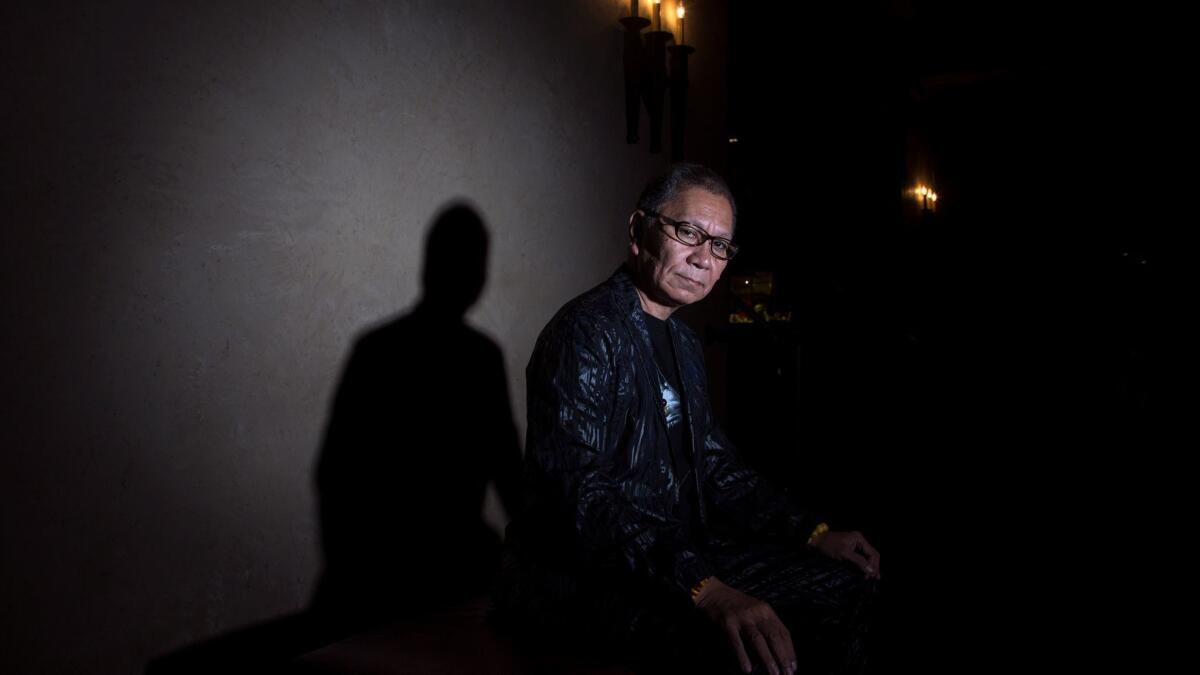With ‘Blade of the Immortal,’ Takashi Miike delivers his 100th film

Takashi Miike has a recurring dream. In it he’s flying low to the ground, at a slow speed. Somehow when he was younger, he remembered one recent morning in Los Angeles, he had soared higher in his slumber.
“Now I want to get back to where I can fly high again,” the Japanese auteur mused, “and I just can’t get there.”
Miike might strive for loftier heights in his dreams, but in his waking life he hardly makes time for regrets. At 57, the Osaka-born director best known stateside for shocking and ultraviolent films like “Audition” and “Ichi the Killer,” is one of the most prolific creators in cinematic history.
He got his start working as assistant director to Japanese legend Shohei Imamura in the late 1980s on films like “Zegen” and “Black Rain.” Changing times and Japan’s “V-cinema” wave of home video genre fare brought new opportunities. Miike made his move into directing in the early 1990s, churning out low-budget, direct-to-video gangster films and action-comedies at a lightning pace, and never let up.
In L.A. last weekend for the release of his 100th film, “Blade of the Immortal,” a period samurai action-drama about a surly swordsman who can’t die, Miike emphasized that it’s not him but everyone else who insists on keeping count.
It’s not that I had the goal of making a lot of movies; that wasn’t really my intention.
— Takashi Miike
“It’s not that I had the goal of making a lot of movies; that wasn’t really my intention,” he said, speaking through a translator. “But by making movies at a natural pace, and also because I had a lot of work and the requests for my work just never stopped, that just kind of led to 100 movies.”
He has described his younger self as far from a model student, one who skipped class and lazed away his summers. But at summer’s end, he says, he’d always mourn the time he’d frittered away.
Time, and what he does with it, seems to be ever present in Miike’s mind.That much is apparent in the breakneck pace with which he still makes films. He hasn’t made fewer than two films per year since 1992, often filming four to five features annually — all the while maintaining his signature audacious sensibility and persistently brash style, sending an anarchic and singular shock through the echelons of contemporary Japanese cinema.
But Miike isn’t just one of moviedom’s most prolific filmmakers; he’s also one of its most wantonly versatile, with children’s tales, fantasy-musicals, a pastiche East-meets-Western, yakuza crime movies, and J-horror flicks all under his belt.
Gorier crossover hits like 1999’s critically hailed “Audition” — which made audiences cringe and cower with deft use of piano wire — turned Miike into an international ambassador of Asian extreme cinema. He also became a staple of the Cannes and Venice film festivals with his movies “Gozu,” “Sukiyaki Western Django,” “13 Assassins” and “Hara-Kiri: Death of a Samurai.”
Adapted from Hiroaki Samura’s popular manga and far from his first samurai story, “Blade of the Immortal” explores some of Miike’s recurring fascinations. Its hero, Manji (played by Japanese pop idol Takuya Kimura), is a samurai whose fateful actions cost him dearly, leading to the death of his sister.
Avenging her in the film’s opening prologue, Manji slashes his way through hundreds of enemies with furious vengeance before being saved from death — or cursed with life — by a supernatural gift of immortality. Decades later, Manji is enlisted to help a young girl avenge the violent deaths of her parents and everyone else in their family dojo at the hands of an anarchic villain.
“I set out to prove this theory, or this idea that I have, about death,” Miike said. “In every country there is this desire to want to be immortal, or to continue to stay young, or to keep living in this world. A lot of people equate that with happiness. They equate that with a long life — maybe even an eternal life.”
“But we know in our hearts that that’s impossible,” he continued. “So one of the things I wanted to say with this was, if you could have that immortality and you were able to get past the barrier of death, to get to the other side where you are immortal — is there really paradise there?
“The fact that we have a short, limited life here is actually what makes it so beautiful and so enjoyable. Making it longer and making it eternal is not necessarily going to make it better.”
In typical Miike fashion “Blade of the Immortal” is unsparingly violent and darkly comical; not even he can venture a guess as to how many souls perish in the film’s numerous onscreen samurai massacres.
“If you have a gun you can shoot from very far away,” he offered. “There’s a disconnect there. But if you have a sword you have to be up close. You have to be able to feel that person’s breath on you to be able to kill them with a sword. You feel the human life of the other person.”
Miike’s status among gorehounds and genre cineastes is underscored in the contemporaries who flocked to fete him Friday in Beverly Hills, where directors Walter Hill, Quentin Tarantino, Edgar Wright, John Landis, and Oliver Stone held court all evening at a private party held in Miike’s honor.
And yet Miike, the master of Japanese shock cinema who says Tobe Hooper’s “Texas Chainsaw Massacre” made an integral impact on him as a teenager, admits he’s averse to watching extremely violent films. “Horror films are scary!” he laughed. “I don’t want to go pay money to feel scared. That’s just not where my interests lie.”
With 100 films under his belt, he’s nonplussed that most Western moviegoers know him for his more shocking fare. “The impression that audiences have of me is really out of the scope of what I can be concerned about,” he smiled. “But I do make a very wide variety of productions. In Japan on Sunday mornings we have a program for 3-to-6-year-old kids, boys and girls, which is an anti-violence program. They’re singing and dancing and learning about how to avoid violence — and also how to find happiness in life.
“It’s not like I’m trying to strike a balance,” he added. “I’m just glad that I was able to make the films that I wanted to make on both sides of that spectrum.”
One secret to his prolificacy? Don’t be picky — just create.
“I make movies that I personally feel like making, and that’s very important. But I also have made sure that I don’t close myself off to working for low budgets, or with new producers, or from a novel subject matter. It’s not about trying to make a lot of movies but being open to all those different types of projects.”
And when he’s making films, he says, the work is profoundly affecting him in turn. “I think movies don’t just change the viewer. Movies also change their creators,” he said. He describes the act of directing as more than merely dictating a vision.
“The film is almost making [me], and pulling [me] into it and saying, ‘This is what I want to be.’ The cuts, the edits, all of that is the result of the film wanting to be made — the film making itself, with the facilitation of the director, based on the interactions of all the players.”
“The way that I make films, it’s always very visceral and directly connected to the emotion,” he said. “Honestly, I didn’t go to film school very much. So the way that I know to make films is by finding that connection with the audience, looking at how they’re going to react, and just creating things from a visceral direct feeling. And that’s not something that I’m creating artificially; that is just who I am.”
Miike, who was invited to join the Academy of Motion Picture Arts and Sciences this year, is showing no signs of slowing; he’s already working on his next two films back home. But even as he charges forward, that recurring dream has him longing for the past.
“The feeling I get from those dreams is that I would really like to go back to when I was a child,” he said. “That was when I enjoyed the pure enjoyment and fun of movies the most.”
ALSO:
Takashi Miike goes big with bloody action in epic ‘Blade of the Immortal’
More to Read
Only good movies
Get the Indie Focus newsletter, Mark Olsen's weekly guide to the world of cinema.
You may occasionally receive promotional content from the Los Angeles Times.







